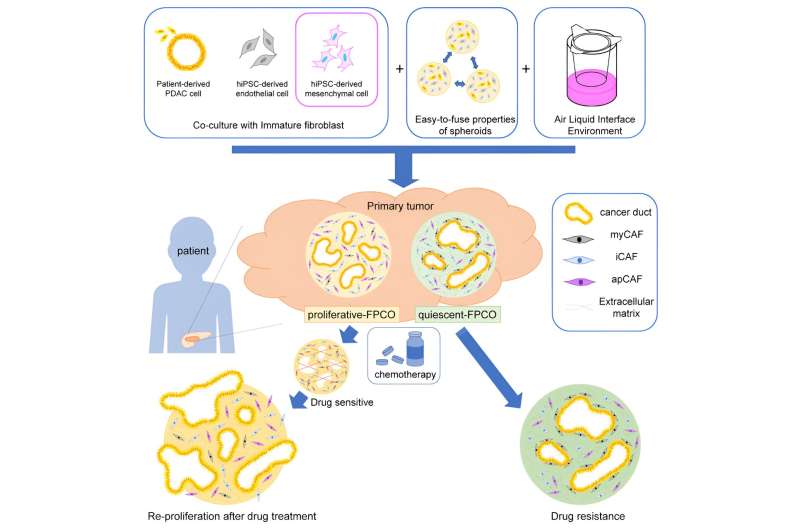This article has been reviewed according to Science X's editorial process and policies. Editors have highlighted the following attributes while ensuring the content's credibility:
fact-checked
peer-reviewed publication
trusted source
proofread
Novel pancreatic cancer organoids show promise for effective screening of anticancer drugs

Pancreatic ductal adenocarcinoma (PDAC), that arises from pancreatic epithelial cells, is the most common form of pancreatic cancer, with a very high mortality rate. This elevated mortality is associated with the unique tumor microenvironment (TME), known for increased resistance to chemotherapy and high metastatic potential.
TME is characterized by the presence of a complex stromal structure comprising cancer-associated fibroblasts (CAFs), tumor endothelial cells (TECs), and a variety of immune cells.
CAFs are specific cells primarily involved in the overall aggressiveness and spread of cancer cells. These cells can further be categorized into several types based on their cellular characteristics and roles, such as inflammatory, myofibroblastic, and antigen-presenting CAFs. Therefore, developing a cell culture system for PDAC that mimics the unique TME involving different types of CAFs is the need of the hour.
To this end, a research team from Japan attempted to create cancer cell organoid systems that can effectively resemble PDAC and act as a screening tool in anticancer research. Dr. Takeuchi Kenta, a research assistant at the Institute of Medical Science, including Associate Professor Tanimizu Naoki and Professor Taniguchi Hideki, both from the Institute of Medical Science, The University of Tokyo, were involved in this novel research.
Their research findings were published in Cell Reports journal.
Dr. Takeuchi Kenta briefly discusses his motivation behind the research. He says, "To reproduce the complexity of PDAC-TME in cell culture models is challenging. Therefore, we used human-induced pluripotent stem cell (hiPSC)-derived mesenchymal cells that can differentiate to multiple types of CAFs and established a novel PDAC organoid."
The research team used patient-derived PDAC cells with hiPSC-derived endothelial and mesenchymal cells to create fused pancreatic cancer organoids (FPCO). This innovative approach yielded two distinct FPCOs, a proliferative FPCO (pFPCO), and a quiescent FPCO (qFPCO), which resemble a typical patient's PDAC tissue.
Notably, qFPCOs exhibited strong chemo-resistance capabilities, whereas pFPCOs could reproliferate after initial drug treatment. Using advanced techniques such as stem cell technology along with analyses like single-cell RNA sequencing and in-vitro cancer assays, the functional properties of the PDAC organoid system were studied and characterized.
Dr. Tanimizu Naoki concludes, "PDAC is a disease that often requires surgical resection and has no other viable treatment options. Also, anti-PDAC drugs have generally failed at different stages of clinical trials. Hence, PDAC organoids with unique TME profiles should be used for anticancer drug screening. Our PDAC model can help future research in cancer biology and in personalized health care."
More information: Kenta Takeuchi et al, Incorporation of human iPSC-derived stromal cells creates a pancreatic cancer organoid with heterogeneous cancer-associated fibroblasts, Cell Reports (2023). DOI: 10.1016/j.celrep.2023.113420



















